The political structure of Great Britain. The politics

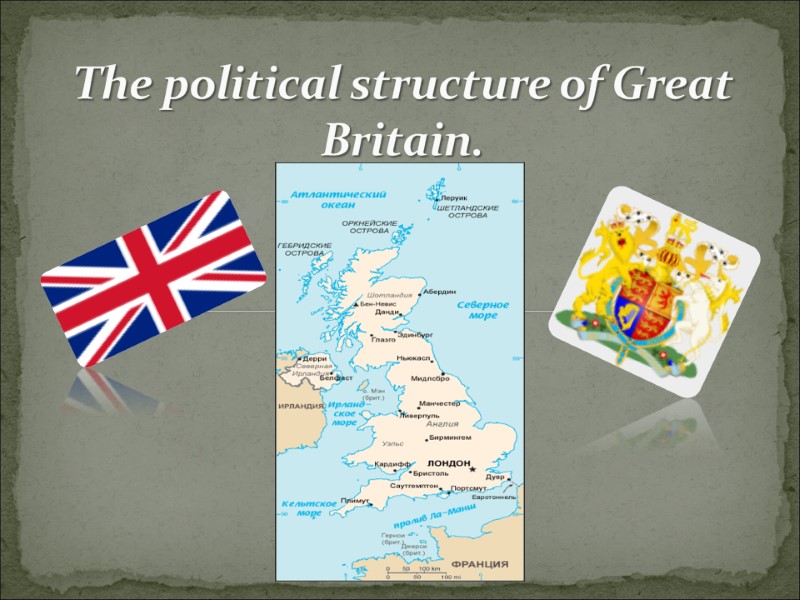
The political structure of Great Britain.
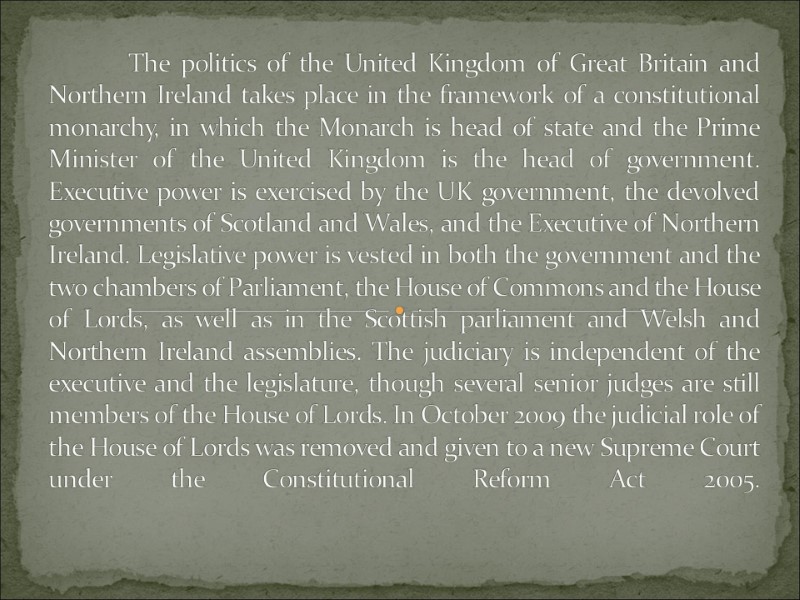
The politics of the United Kingdom of Great Britain and Northern Ireland takes place in the framework of a constitutional monarchy, in which the Monarch is head of state and the Prime Minister of the United Kingdom is the head of government. Executive power is exercised by the UK government, the devolved governments of Scotland and Wales, and the Executive of Northern Ireland. Legislative power is vested in both the government and the two chambers of Parliament, the House of Commons and the House of Lords, as well as in the Scottish parliament and Welsh and Northern Ireland assemblies. The judiciary is independent of the executive and the legislature, though several senior judges are still members of the House of Lords. In October 2009 the judicial role of the House of Lords was removed and given to a new Supreme Court under the Constitutional Reform Act 2005.
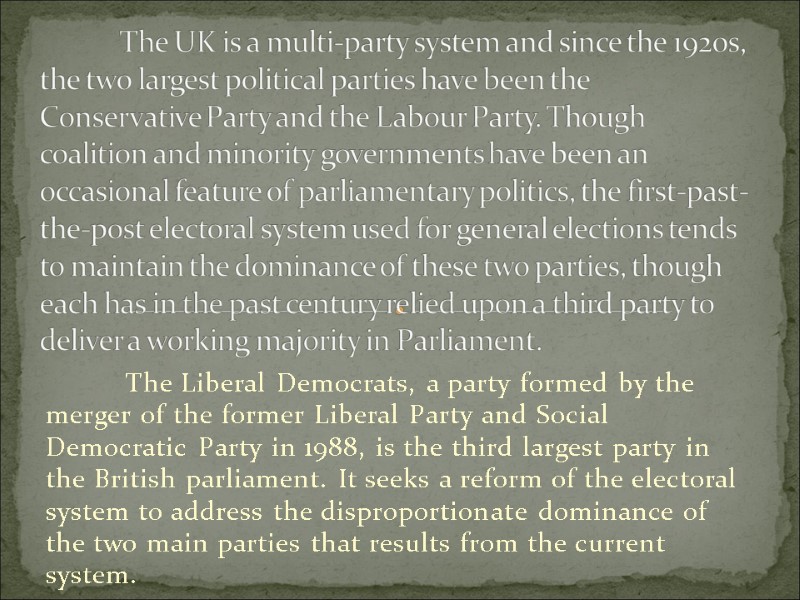
The Liberal Democrats, a party formed by the merger of the former Liberal Party and Social Democratic Party in 1988, is the third largest party in the British parliament. It seeks a reform of the electoral system to address the disproportionate dominance of the two main parties that results from the current system. The UK is a multi-party system and since the 1920s, the two largest political parties have been the Conservative Party and the Labour Party. Though coalition and minority governments have been an occasional feature of parliamentary politics, the first-past-the-post electoral system used for general elections tends to maintain the dominance of these two parties, though each has in the past century relied upon a third party to deliver a working majority in Parliament.
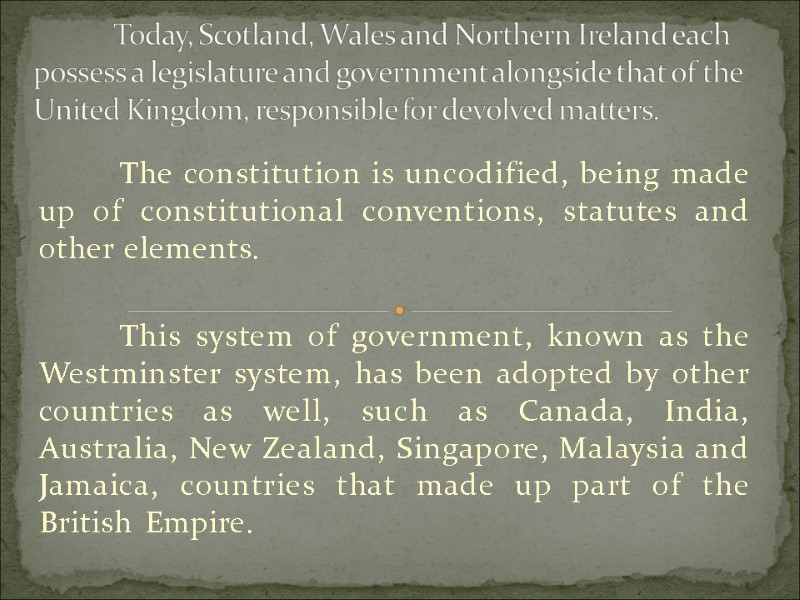
The constitution is uncodified, being made up of constitutional conventions, statutes and other elements. This system of government, known as the Westminster system, has been adopted by other countries as well, such as Canada, India, Australia, New Zealand, Singapore, Malaysia and Jamaica, countries that made up part of the British Empire. Today, Scotland, Wales and Northern Ireland each possess a legislature and government alongside that of the United Kingdom, responsible for devolved matters.
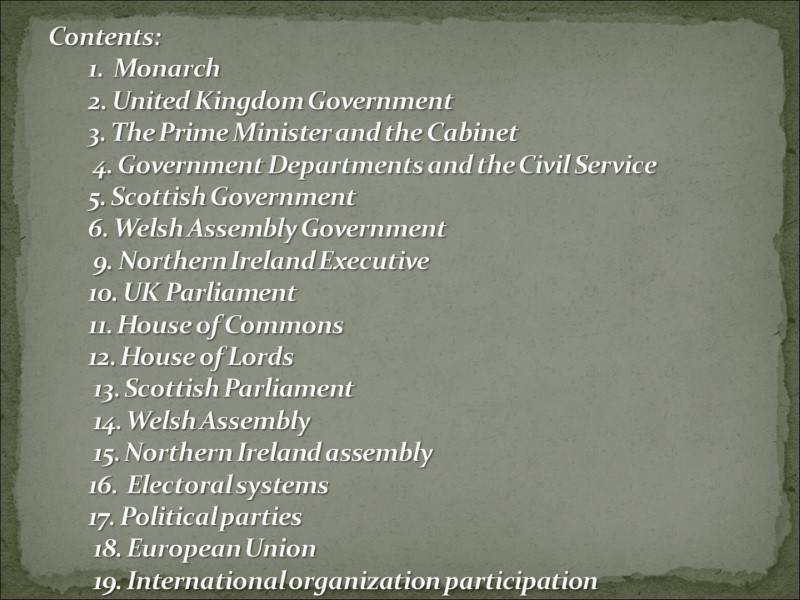
Contents: 1. Monarch 2. United Kingdom Government 3. The Prime Minister and the Cabinet 4. Government Departments and the Civil Service 5. Scottish Government 6. Welsh Assembly Government 9. Northern Ireland Executive 10. UK Parliament 11. House of Commons 12. House of Lords 13. Scottish Parliament 14. Welsh Assembly 15. Northern Ireland assembly 16. Electoral systems 17. Political parties 18. European Union 19. International organization participation
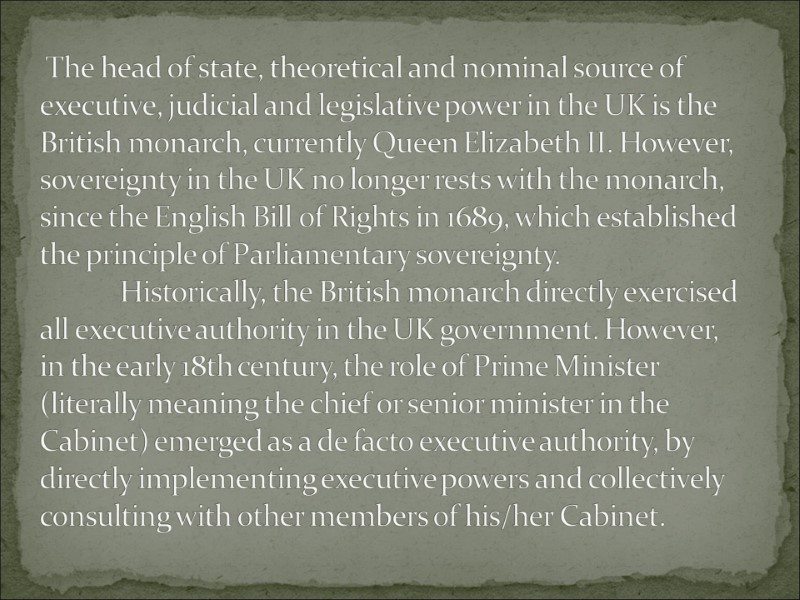
The head of state, theoretical and nominal source of executive, judicial and legislative power in the UK is the British monarch, currently Queen Elizabeth II. However, sovereignty in the UK no longer rests with the monarch, since the English Bill of Rights in 1689, which established the principle of Parliamentary sovereignty. Historically, the British monarch directly exercised all executive authority in the UK government. However, in the early 18th century, the role of Prime Minister (literally meaning the chief or senior minister in the Cabinet) emerged as a de facto executive authority, by directly implementing executive powers and collectively consulting with other members of his/her Cabinet.
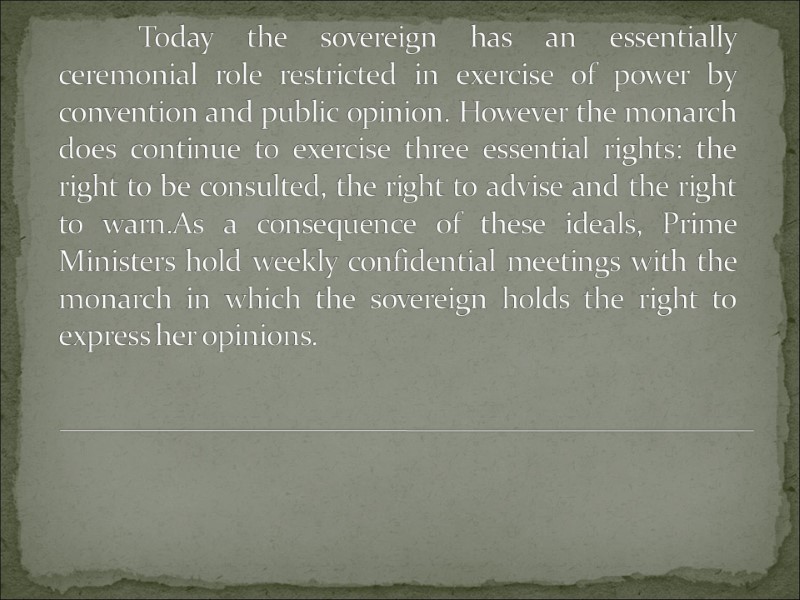
Today the sovereign has an essentially ceremonial role restricted in exercise of power by convention and public opinion. However the monarch does continue to exercise three essential rights: the right to be consulted, the right to advise and the right to warn.As a consequence of these ideals, Prime Ministers hold weekly confidential meetings with the monarch in which the sovereign holds the right to express her opinions.
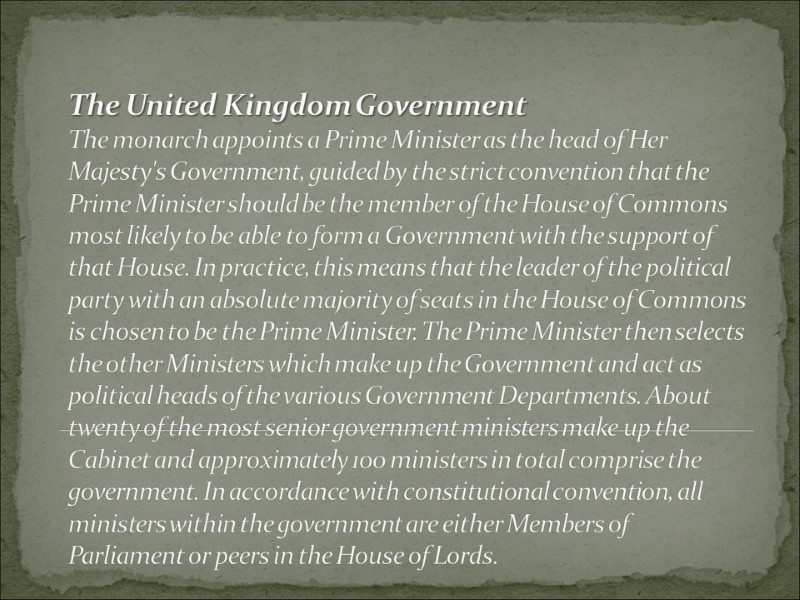
The United Kingdom Government The monarch appoints a Prime Minister as the head of Her Majesty's Government, guided by the strict convention that the Prime Minister should be the member of the House of Commons most likely to be able to form a Government with the support of that House. In practice, this means that the leader of the political party with an absolute majority of seats in the House of Commons is chosen to be the Prime Minister. The Prime Minister then selects the other Ministers which make up the Government and act as political heads of the various Government Departments. About twenty of the most senior government ministers make up the Cabinet and approximately 100 ministers in total comprise the government. In accordance with constitutional convention, all ministers within the government are either Members of Parliament or peers in the House of Lords.
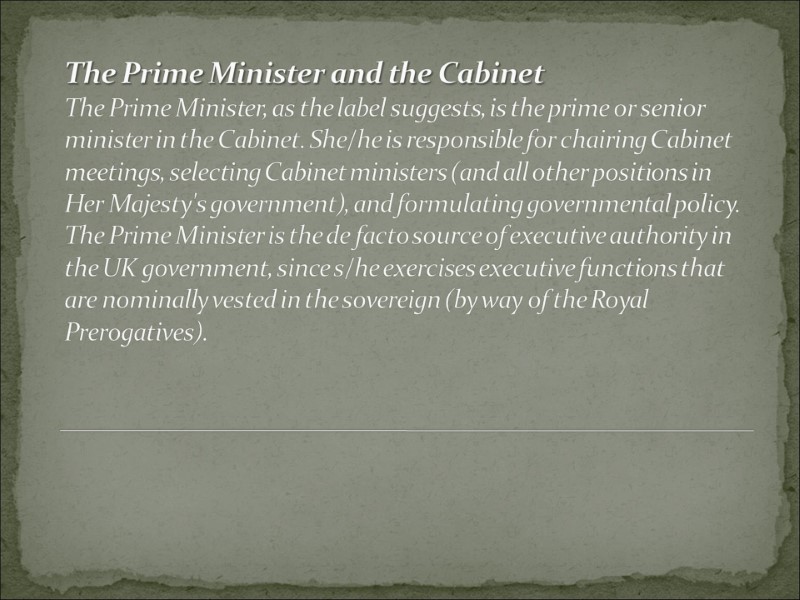
The Prime Minister and the Cabinet The Prime Minister, as the label suggests, is the prime or senior minister in the Cabinet. She/he is responsible for chairing Cabinet meetings, selecting Cabinet ministers (and all other positions in Her Majesty's government), and formulating governmental policy. The Prime Minister is the de facto source of executive authority in the UK government, since s/he exercises executive functions that are nominally vested in the sovereign (by way of the Royal Prerogatives).
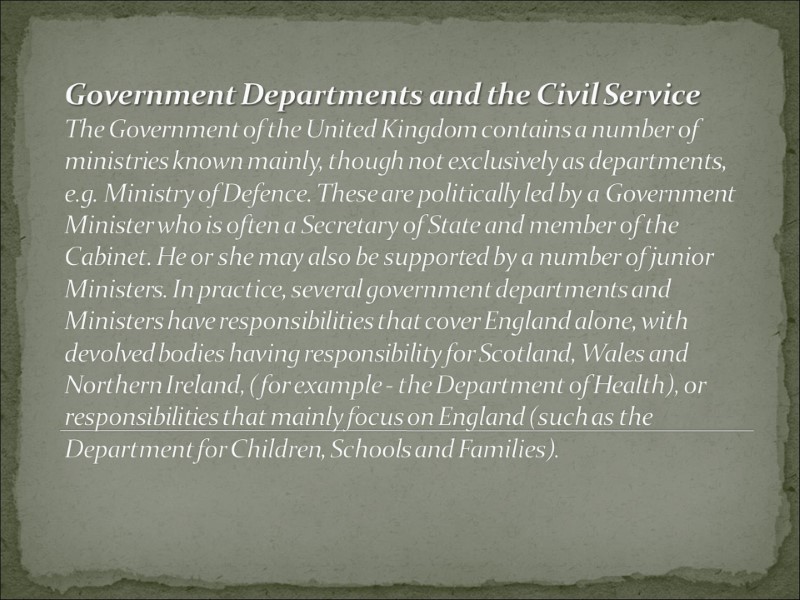
Government Departments and the Civil Service The Government of the United Kingdom contains a number of ministries known mainly, though not exclusively as departments, e.g. Ministry of Defence. These are politically led by a Government Minister who is often a Secretary of State and member of the Cabinet. He or she may also be supported by a number of junior Ministers. In practice, several government departments and Ministers have responsibilities that cover England alone, with devolved bodies having responsibility for Scotland, Wales and Northern Ireland, (for example - the Department of Health), or responsibilities that mainly focus on England (such as the Department for Children, Schools and Families).
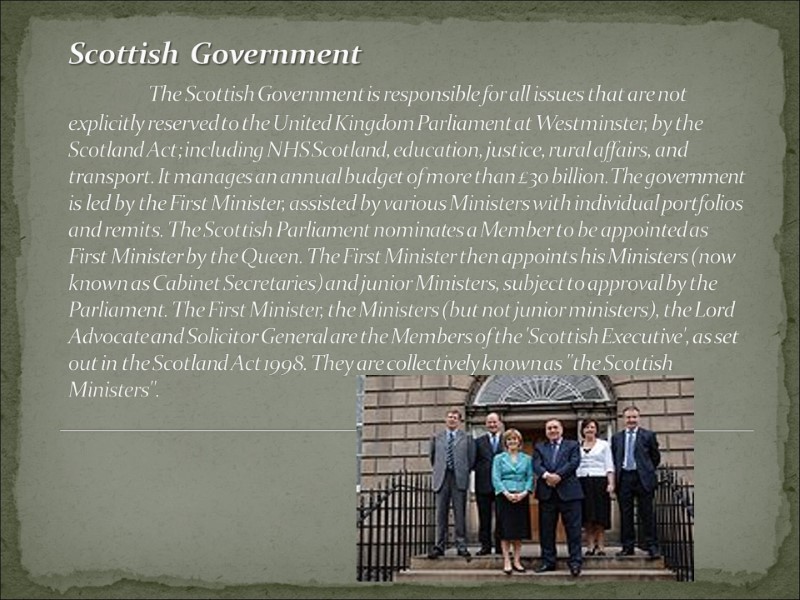
Scottish Government The Scottish Government is responsible for all issues that are not explicitly reserved to the United Kingdom Parliament at Westminster, by the Scotland Act; including NHS Scotland, education, justice, rural affairs, and transport. It manages an annual budget of more than £30 billion.The government is led by the First Minister, assisted by various Ministers with individual portfolios and remits. The Scottish Parliament nominates a Member to be appointed as First Minister by the Queen. The First Minister then appoints his Ministers (now known as Cabinet Secretaries) and junior Ministers, subject to approval by the Parliament. The First Minister, the Ministers (but not junior ministers), the Lord Advocate and Solicitor General are the Members of the 'Scottish Executive', as set out in the Scotland Act 1998. They are collectively known as "the Scottish Ministers".
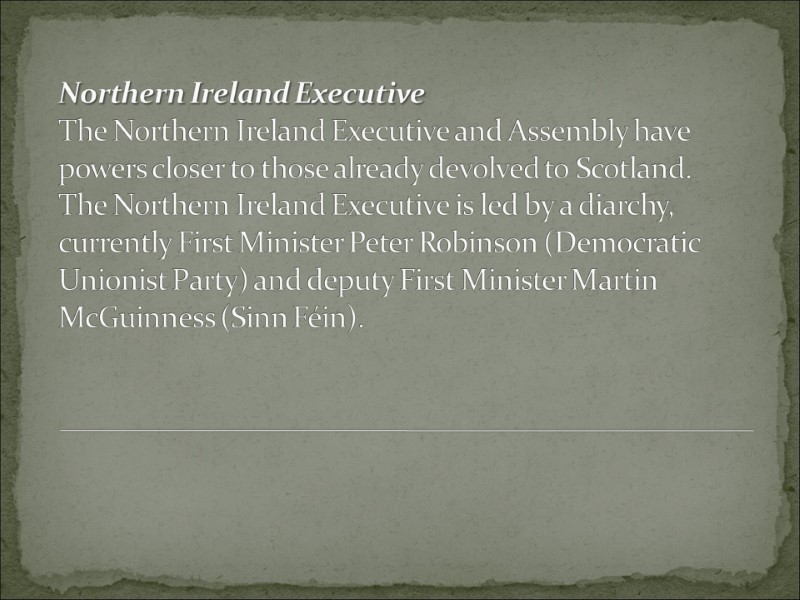
Northern Ireland Executive The Northern Ireland Executive and Assembly have powers closer to those already devolved to Scotland. The Northern Ireland Executive is led by a diarchy, currently First Minister Peter Robinson (Democratic Unionist Party) and deputy First Minister Martin McGuinness (Sinn Féin).
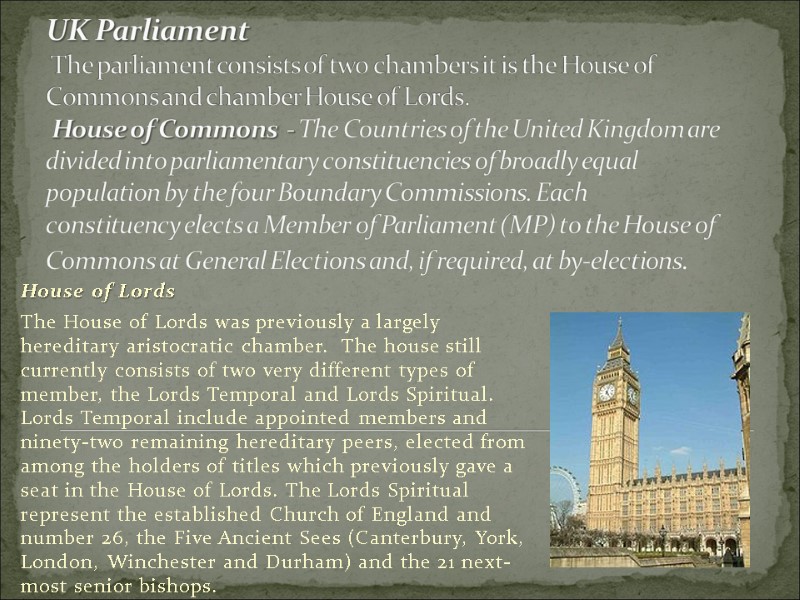
UK Parliament The parliament consists of two chambers it is the House of Commons and chamber House of Lords. House of Commons - The Countries of the United Kingdom are divided into parliamentary constituencies of broadly equal population by the four Boundary Commissions. Each constituency elects a Member of Parliament (MP) to the House of Commons at General Elections and, if required, at by-elections. House of Lords The House of Lords was previously a largely hereditary aristocratic chamber. The house still currently consists of two very different types of member, the Lords Temporal and Lords Spiritual. Lords Temporal include appointed members and ninety-two remaining hereditary peers, elected from among the holders of titles which previously gave a seat in the House of Lords. The Lords Spiritual represent the established Church of England and number 26, the Five Ancient Sees (Canterbury, York, London, Winchester and Durham) and the 21 next-most senior bishops.
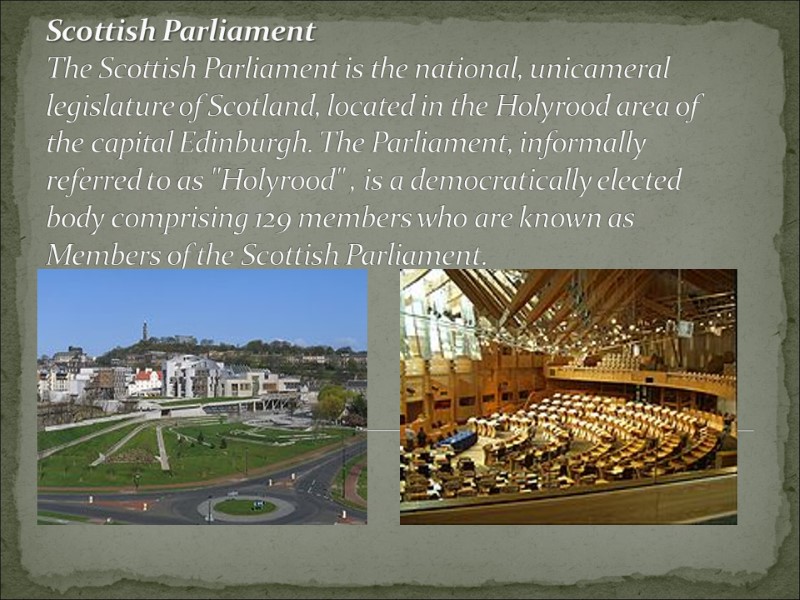
Scottish Parliament The Scottish Parliament is the national, unicameral legislature of Scotland, located in the Holyrood area of the capital Edinburgh. The Parliament, informally referred to as "Holyrood" , is a democratically elected body comprising 129 members who are known as Members of the Scottish Parliament.
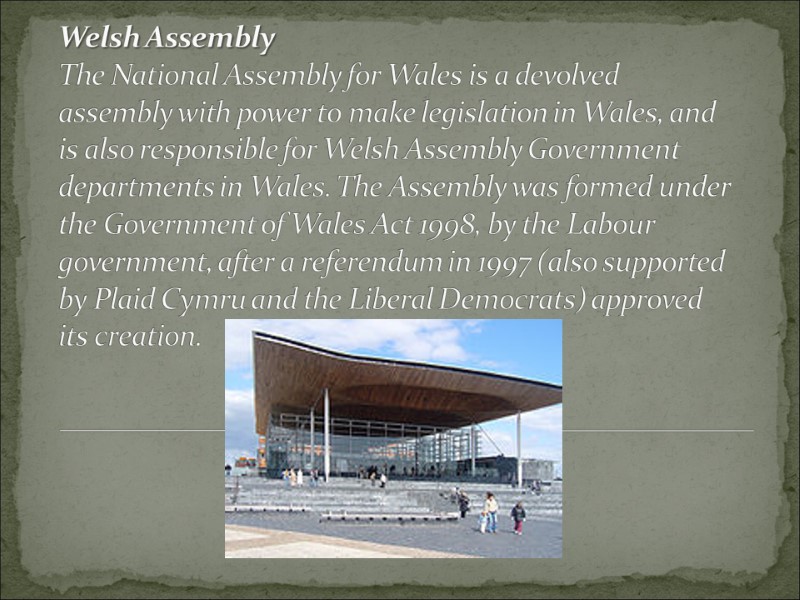
Welsh Assembly The National Assembly for Wales is a devolved assembly with power to make legislation in Wales, and is also responsible for Welsh Assembly Government departments in Wales. The Assembly was formed under the Government of Wales Act 1998, by the Labour government, after a referendum in 1997 (also supported by Plaid Cymru and the Liberal Democrats) approved its creation.
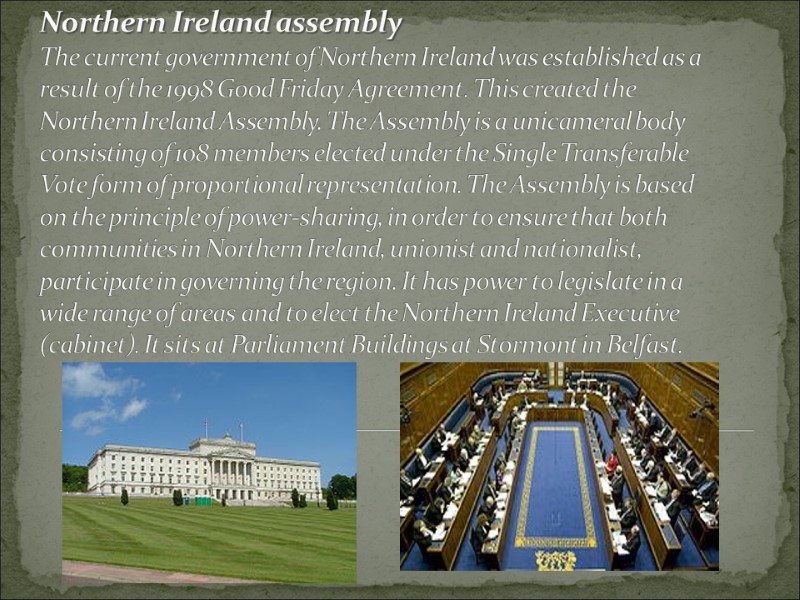
Northern Ireland assembly The current government of Northern Ireland was established as a result of the 1998 Good Friday Agreement. This created the Northern Ireland Assembly. The Assembly is a unicameral body consisting of 108 members elected under the Single Transferable Vote form of proportional representation. The Assembly is based on the principle of power-sharing, in order to ensure that both communities in Northern Ireland, unionist and nationalist, participate in governing the region. It has power to legislate in a wide range of areas and to elect the Northern Ireland Executive (cabinet). It sits at Parliament Buildings at Stormont in Belfast.
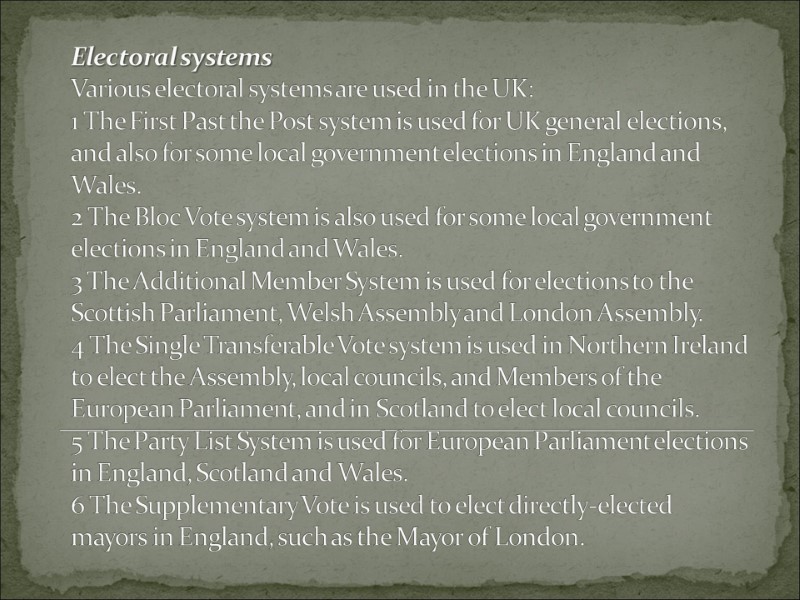
Electoral systems Various electoral systems are used in the UK: 1 The First Past the Post system is used for UK general elections, and also for some local government elections in England and Wales. 2 The Bloc Vote system is also used for some local government elections in England and Wales. 3 The Additional Member System is used for elections to the Scottish Parliament, Welsh Assembly and London Assembly. 4 The Single Transferable Vote system is used in Northern Ireland to elect the Assembly, local councils, and Members of the European Parliament, and in Scotland to elect local councils. 5 The Party List System is used for European Parliament elections in England, Scotland and Wales. 6 The Supplementary Vote is used to elect directly-elected mayors in England, such as the Mayor of London.
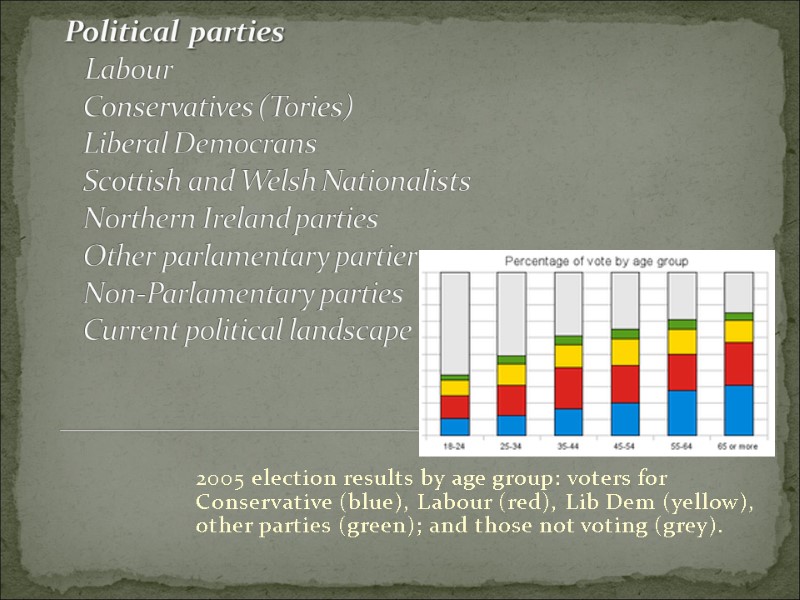
Political parties Labour Conservatives (Tories) Liberal Democrans Scottish and Welsh Nationalists Northern Ireland parties Other parlamentary partier Non-Parlamentary parties Current political landscape 2005 election results by age group: voters for Conservative (blue), Labour (red), Lib Dem (yellow), other parties (green); and those not voting (grey).
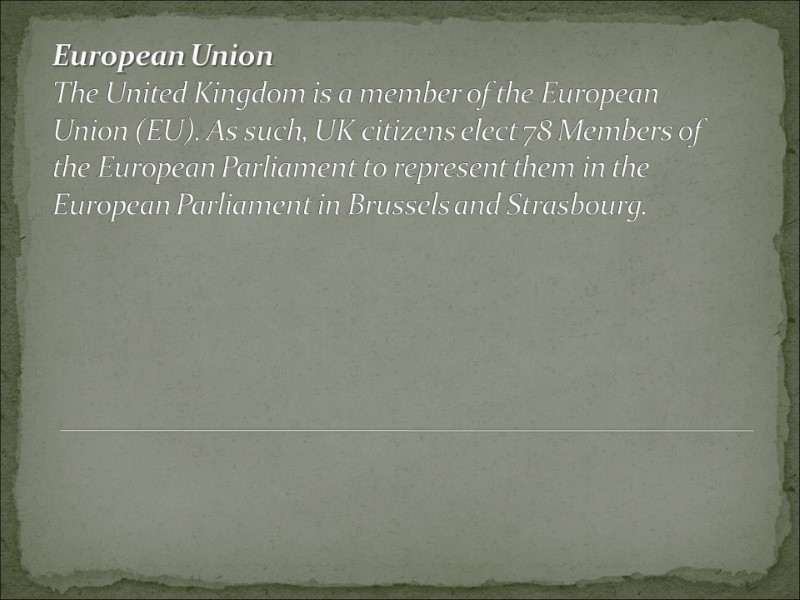
European Union The United Kingdom is a member of the European Union (EU). As such, UK citizens elect 78 Members of the European Parliament to represent them in the European Parliament in Brussels and Strasbourg.
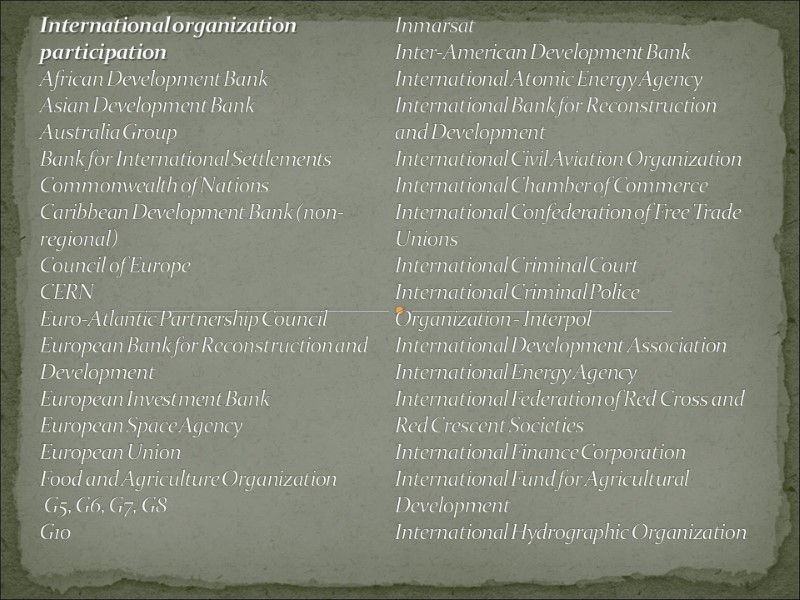
International organization participation African Development Bank Asian Development Bank Australia Group Bank for International Settlements Commonwealth of Nations Caribbean Development Bank (non-regional) Council of Europe CERN Euro-Atlantic Partnership Council European Bank for Reconstruction and Development European Investment Bank European Space Agency European Union Food and Agriculture Organization G5, G6, G7, G8 G10 Inmarsat Inter-American Development Bank International Atomic Energy Agency International Bank for Reconstruction and Development International Civil Aviation Organization International Chamber of Commerce International Confederation of Free Trade Unions International Criminal Court International Criminal Police Organization - Interpol International Development Association International Energy Agency International Federation of Red Cross and Red Crescent Societies International Finance Corporation International Fund for Agricultural Development International Hydrographic Organization
8118-the_political_structure_of_great_britain_srs.ppt
- Количество слайдов: 20

